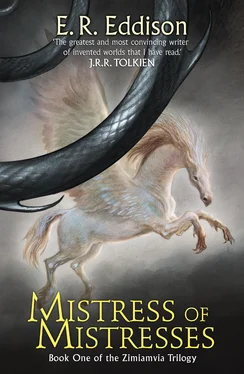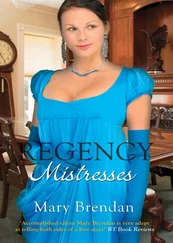The silence opened like a lily, and the Señorita’s words came like the lily’s fragrance: ‘Tell me something that you remember. It is good to keep memories green.’
‘I remember,’ answered I, ‘that he and I first met by candlelight. And that was forty-eight years ago. A good light to meet by; and a good light for parting.’
‘Tell me,’ she said.
‘It was Easter time at Mardale Green in Cumberland. I had just left school. I was spending the holidays with an aunt of mine who had a big house in the Eamont valley. On Easter Sunday after a hard day by myself on the fells, I found myself looking down on Mardale and Haweswater from the top of Kidsty Pike. It was late afternoon, and the nights still closed in early. There was leavings of snow on the tops. Beneath my feet the valley was obscure purple, the shadows of night boiling up from below while weak daylight still walked the upper air and the mountain ridges. I ran down the long spur that Kidsty Pike sends down eastwards, dividing Randale from Riggindale. I was out of breath, and half deaf too after the quick descent, for I had come down about fifteen hundred feet, I suppose, in twelve minutes by the time I came to cross the beck by the farmhouse at Riggindale. Then I saw the light in the church windows through the trees. I remembered that Haweswater and all its belongings were condemned to be drowned twenty feet deep in water in order that some hive of civilization might be washed, and I thought I would go in to evening service in that little church now while I might, before there were fishes in its yew-trees instead of owls. So I stumbled my way from the gathering dusk of the quiet lane through the darkness of those tremendous yews, and so by the curtained doorway under the square tower into that tiny church. I loved it at first sight, coming in from the cold and darkness outside: a place of warmth and gentle candles, with its pews of oak blackened with age, its little Jacobaean gallery, its rough whitewashed walls, simple pointed windows, low dark roof-beams: a glamorous and dazzling loveliness such as a child’s eyes feed upon in its first Christmas tree. As I found my way to a seat half-way up the aisle on the north side, I remember thinking of those little earthenware houses, white, green, and pink, that you can put a night-light inside; things I had forgotten for years, but I had one (as I remembered) long ago, in those lavender and musk-smelling days of childhood, which seemed far more distant to me then, when I was nineteen, than they do now; German things, I fancy: born of the old good German spirit of Struwwelpeter and Christmas trees. Yes, it was those little earthenware houses that I thought of as I sat there, sensuously loving the candlelight and the moving shadows it threw: safe shadows, like those there used to be in the nursery when your nurse was still there; not the ghostly shadows that threatened and hovered when she had gone down to supper and you were left alone. And these shadows and the yellow glamour of the candles fell on kind safe faces, like hers: an old farmer with furrowed, strong, big-boned, storm-weathered features, not in his Sunday-go-to-meeting suit, but with heavy boots nailed and plastered with mud, as if he had walked a good distance to church, and rough strong tweed coat and breeches. Three or four farmers, a few farm men, a few women and girls, an old woman, a boy or two, one or two folk in the little gallery above the door: that was all the congregation. But what pleased me most of all was the old parson, and his way of conducting the service. He was white-haired, with a bristly moustache. He did everything himself single-handed: said the prayers, read the lessons, collected the offertory, played the harmonium that did duty for an organ, preached the sermon. And all these things he did methodically and without hurry or self-consciousness, as you might imagine him looking after a roomful of friends at supper in the little rectory across the road. His sermon was short and full of personalities, but all kindly and gentle-humoured. His announcements of times of services, appointments for weddings, christenings and what not, were interspersed with detailed and homely explanations, given not in the least ex cathedra but as if across the breakfast-table. One particularly I remember, when he gave out: “Hymn number one hundred and forty: the one hundred and fortieth hymn: Jesus lives! No longer now Can thy terrors, death, appal us .” Then, before sitting down to the harmonium, he looked very benevolently at his little flock over the tops of his spectacles, and said, “I want everybody to try and get the words right. Some people make a mistake about the first line of this hymn, and give it quite a wrong meaning. Remember to pause after ‘lives’: ‘Jesus lives!’ Don’t do like some people do, and say ‘Jesus lives no longer now’: that is quite wrong: gives quite a wrong meaning: it makes nonsense. Now then: ‘Jesus lives! No longer now’;” and he sat down to the harmonium and began.
‘It was just at that moment, as we all stood up to sing that innocent hymn with its difficult first line, that I first saw Lessingham. He was away to my right, at the back on the south side, and as the congregation rose I looked half round and saw him. I remember, years later, his describing to me the effect of the sudden view you get of Nanga Parbat from one of those Kashmir valleys; you have been riding for hours among quiet richly wooded scenery, winding up along the side of some kind of gorge, with nothing very big to look at, just lush, leafy, pussy-cat country of steep hillsides and waterfalls; then suddenly you come round a corner where the view opens up the valley, and you are almost struck senseless by the blinding splendour of that vast face of ice-hung precipices and soaring ridges, sixteen thousand feet from top to toe, filling a whole quarter of the heavens at a distance of, I suppose, only a dozen miles. And now, whenever I call to mind my first sight of Lessingham in that little daleside church so many years ago, I think of Nanga Parbat. He stood half a head taller than the tallest man there, but it was the grandeur of his bearing that held me, as if he had been some great lord of the renaissance: a grandeur which seemed to sit upon every limb and feature of him with as much fitness, and to be carried with as little regard or notice from himself, as the scrubby old Norfolk jacket and breeches in which he was dressed. His jacket was threadbare, frayed at the cuffs, strapped with leather at the elbows, but it was as if lighted from within, as the flame shows in a horn lantern, with a sense of those sculptured heroes from the Parthenon. I saw the beauty of his hand where it rested on the window-sill, and the ruby burning like a coal in the strange ring he wore on the middle finger. But just as, in a snow mountain, all sublimities soar upwards to the great peak in the empyrean, so in him was all this majesty and beauty and strength gathered at last in the head and face; that serene forehead, those features where Apollo and Ares seemed to mingle, the strong luxurious lines of the mouth showing between the upcurled moustache and the cataract of black beard: that mouth whose corners seemed the lurking-places of all wild sudden gleams, of delightful humour, and melancholy, and swift resolution, and terrible anger. At length his unconscious eyes met mine, and, looking through me as lost in a deep sadness, made me turn away in some confusion.
‘I thought he had been quite unaware of me and my staring; but as we came out into the lane when church was over (it was starlight now, and the moon risen behind the hills) he overtook me and fell into step beside me, saying he noticed that we wore the same tie. I hardly know which was to me the more astonishing, that this man should deign to talk to me at all, or that I should find myself within five minutes swinging along beside him down the lake road, which was my way home, and talking as easily as if it had been to an intimate friend of my own age instead of a man old enough to be my father: a man too who, to all outward seeming, would have been more in his element in the company of Cesare Borgia or Gonsalvo di Cordova. It was not, of course, till some time after this that I knew he traced his descent through many generations of English forefathers to King Eric Bloodaxe in York, the son of Harald Hairfair, that Charlemagne of the north, and, by the female line, from the greatest ruler of men that appeared in Europe in the thousand years between Charlemagne and Napoleon: the Emperor Frederick II, of whom it has been written that “the power, which in the rout of able and illustrious men shines through crannies, in him pours out as through a rift in nature”. In after years I helped Lessingham a good deal in collecting material for his ten-volume History of Frederick II , which is of course today the standard authority on that period, and ranks, as literature, far and away above any other history book since Gibbon.
Читать дальше












